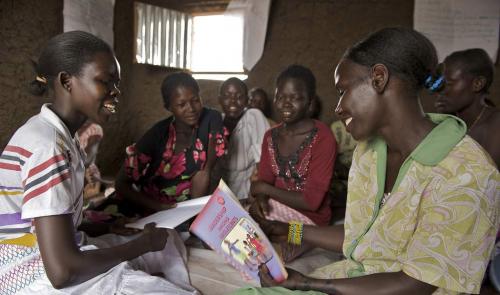Natural resource revenues could nearly double school access in developing nations – UN study
Developing countries rich in natural resources can make huge gains towards universal schooling if they managed resource revenues better and devoted a significant share to education, according to a United Nations study released Tuesday.

Young girls attend Adolescent Girls’ Club in Gudele neighbourhood on the outskirts of Juba in the South Sudan.
The Education for All Global Monitoring Report study, produced by the UN Educational, Scientific and Cultural Organization (UNESCO), argues that by maximizing and transparently managing the revenues from their extractive industries, 17 focus countries could raise an extra $5 billion in funding for education every year – or about two and a half times the amount they received in aid to education in 2010.
“National commitment to education has to be supported by adequate resources. The 17 countries covered in this study face tremendous educational challenges that can be met only through additional financing to expand their systems,” said UNESCO Director-General Irina Bokova.
The study, entitled Turning the resource cures into a blessing for education, finds that revenue from natural resources could enable these countries to reach over 11 million out-of-school children. “This is an investment in future generations that should be seized now,” Ms. Bokova added.
The study illustrates how this can be done. In Uganda for example, the Government’s budget is set to double by 2016 due to recent oil discoveries, which could lead to a doubling of the education budget and send all primary and lower secondary school-aged children to school.
In the Democratic Republic of the Congo (DRC), less than 10 per cent of the revenue from minerals goes back to the country, as 90 per cent of gains go to extracting companies. Changing these percentages would allow the Government to keep more revenue and invest it in education, the report says.
“Many countries have mismanaged the income from their natural resources, have poorly negotiated with extractive companies, or have made misguided spending choices” said Pauline Rose, Director of the Global Monitoring Report.
“In some cases, the funds have been channelled into armed conflicts instead of towards education. If they managed their income revenue better and put 20 per cent of the revenue into education, 10 of the 17 countries we analyzed could reach universal primary education,” she said.
The paper, released just ahead of the World Economic Forum on Africa being held in Cape Town, South Africa, for 8 to 10 May, makes a series of recommendations including maximizing revenues to improve social services, managing and monitoring the use of revenues from natural resources, and channelling at least 20 per cent of natural resource revenue into education.
The countries studied in the report are: Afghanistan, Angola, Burkina Faso, Chad, Cameroon, Democratic Republic of the Congo, Republic of the Congo, Ghana, Guinea, Laos, Malawi, Niger, Papua New Guinea, Sierra Leone, Tanzania, Uganda, and Zambia.
Source: UN News
- 419 reads
Human Rights
Fostering a More Humane World: The 28th Eurasian Economic Summi

Conscience, Hope, and Action: Keys to Global Peace and Sustainability

Ringing FOWPAL’s Peace Bell for the World:Nobel Peace Prize Laureates’ Visions and Actions

Protecting the World’s Cultural Diversity for a Sustainable Future

Puppet Show I International Friendship Day 2020

